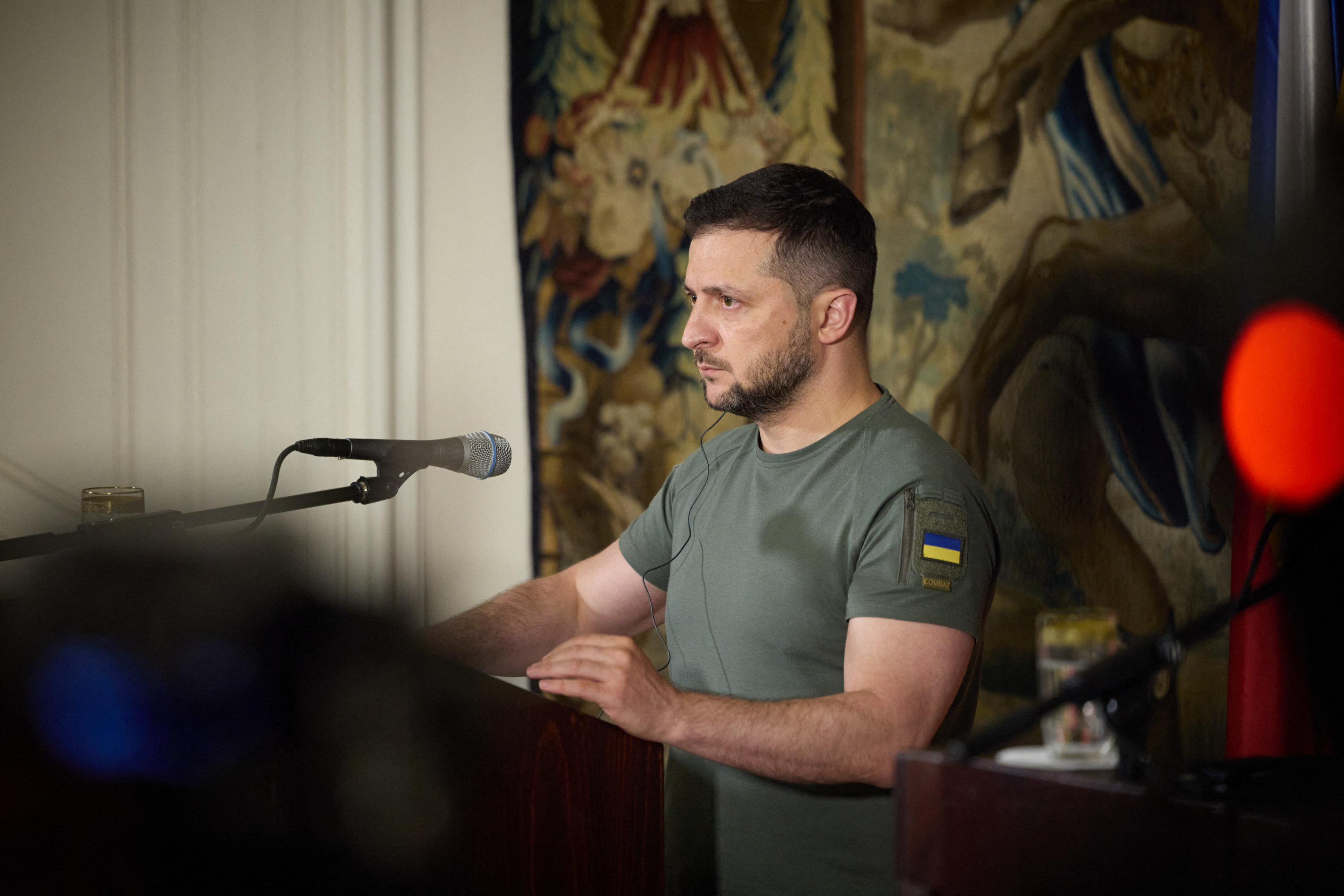NATO Summit
Ukraine and NATO: invitation without expiration date

The President of Ukraine Volodymyr Zelenskyy
© picture alliance / abaca | ABACAThe Lithuanian capital is decorated with "Welcome to NATO" banners showing Swedish and Ukrainian flags. This is how Vilnius is preparing for the summit of the North Atlantic Alliance, which has a chance to become a historic one.
The faster the date of the NATO summit approaches, the more diverse statements we hear about the prospects of NATO membership. They are optimistic, like the ex-NATO Secretary Anders Fogh Rasmussen's call, encouraging, like the words of British Defense Minister Ben Wallace, or cautious, like the words of the current Secretary General of the Alliance, Jens Stoltenberg.
The President of Ukraine Volodymyr Zelenskyy calls on NATO to send a clear signal to Kyiv about joining the Alliance after the end of the war. The Ukrainian parliament (Verkhovna Rada) called for a decision at the summit in Vilnius to invite Ukraine to NATO without passing the Membership Action Plan (MAP) and to develop effective mechanisms to guarantee peace and security in Europe as well as legally binding security guarantees for a nuclear-free Ukraine, which will not become an alternative to Ukraine's membership in the Alliance. Ukrainian civil society organizations also appeal to the participants of the Vilnius summit not to be afraid and to make a decision to invite Ukraine to the Alliance.
Today's Ukraine is doing what NATO was created for
Ukraine's accession to NATO has been enshrined in our Constitution. It is supported by 82% of Ukrainians, with 80% in the South and 72% in the East. In addition, a survey among citizens of France, Germany, Italy, the Netherlands, and the USA shows that in all five countries, there is support for the start of the process of Ukraine joining the Alliance - 70% among Americans, 50% among the Dutch, 53% among Italians, 56% among the French and 50% among Germans.
When the allied forces signed the North Atlantic Treaty on April 4th in 1949, its purpose was to contain the aggression of the Soviet Union, and in the event of war, to oppose it together. Today's Russia is not only the legal successor of the USSR but also its distorted younger twin, which openly threatens the world with nuclear weapons and invades neighboring sovereign countries. In fact, today‘s Ukraine is doing what NATO was created for – resisting a tyrannical aggressor and defending the collective West with the lives of its citizens.
Of course, we could not do this without the armed and financial support of our partners, so we continue thanking them for this. However, it is Ukrainians who are dying in the trenches and under mass rocket attacks, not the citizens of NATO countries or their soldiers. We pay with blood for calm mornings in Brussels.
Ukraine needs security guarantees
In Ukraine we have no illusions that Russia would "calm down" after restoring the borders of 1991. It is unlikely that massive missile attacks on large Ukrainian cities and critical infrastructure will stop, nor will attempts at border attacks or raids by enemy‘s sabotage and intelligence groups stop. Therefore, Ukraine needs security guarantees, and such guarantees can only be achieved through full membership in NATO.
Now there are talks about alternative models of relations between Ukraine and the Alliance. The USA and Israel are examples. What is meant here is the fact that the United States invests a lot of money in the security of Israel, supplies new technologies and weapons, and to some extent is responsible for the security of the country, but not for the physical protection of Israel in the event of aggression.
In fact, this is the kind of relationship Ukraine now has with NATO and it is an acceptable situation for now (although it needs specifics and documentation of obligations), but not for the future. For us, it is vitally important that not just half-measures or half-steps are taken for our security, which is why we insist on membership in the Alliance.
NATO will also benefit from the accession of Ukraine
Let's be honest, NATO will also benefit from the accession of Ukraine. Currently, the Armed Forces of our country are the only ones in the Alliance who have combat experience during a full-scale war, not local operations. Operated by Ukrainians, Western weapons show results that exceed even the expectations of manufacturers. Tens of thousands of Ukrainian servicemen undergo training in NATO countries in accordance with the Alliance's standards. Our army not only stopped what was once called the "second army of the world", but also gave a decent fight back and is now liberating the occupied territories.
We are all aware that it is impossible for Ukraine to join NATO while a full-scale war continues. However, we must have a documented, clear plan to join the Alliance immediately after the end of the war. Finland has shown that with common consent it is possible to do this quickly and without MAP.
We remember the words of Senator John McCain – Russia is provoked by weakness. And although Putin is trying to make it seem like Russia is fighting (actually losing the war) precisely against NATO, and not against Ukraine, he is very afraid of the Alliance. The fear of Article 5 is based on the prospect of being fought back by a stronger, more technologically advanced, and much better opponent than you. And no matter how crazy the Kremlin's helmsman is, he is perfectly aware of this fact. That is why our membership in the Alliance is a guarantee that war will not repeat itself in the heart of Europe.
For years, Ukraine has heard the maxim that "NATO's doors are open." But we could not enter those doors. It’s time to change that.
Kira Rudik, Member of Ukraine’s Parliament, Leader of Golos party, Vice President of ALDE.
